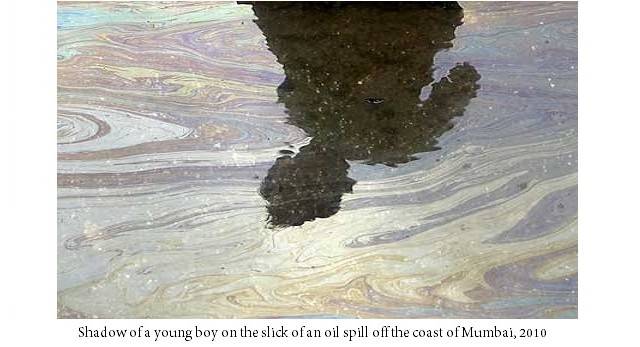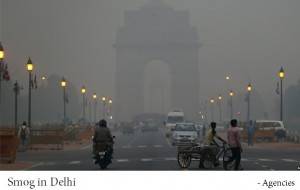Economy & Ecology: The Inconvenient Truths

“Capitalism, as it’s conceived and conducted today; capitalism that relies on globalization, unbridled consumerism, deregulation and perpetual economic expansion, is irreconcilable with a livable climate.” – Naomi Klein, Capitalism vs. The Climate
Economy and Ecology: Disclosing the Inconvenient Truths
By SB Veda
CALCUTTA – This week we feature two articles on the conflict between capitalism and the environment: One describes the mysterious set of illnesses affecting children in the village of Jadugora in Jharkand, India, the sight of India’s first major uranium mine (now closed); and the second is an interview with left-wing author and thinker, Naomi Klein on her new book, which was published, yesterday called Capitalism vs. The Climate
The two, which ought to be read together, put me in mind of my student days.
As a post-graduate student in at McGill University, Montreal, when I was part of a group of friends who felt called to change the world for the better, I wrote a paper combining two of my fields of study: Environmental Sciences and Finance. Then, as now, my politics agreed with those of Klein and others of her ilk. But I was not necessarily convinced that political solutions could resolve the problems of capitalism.
I did not feel then and do not still feel that the profit motive, itself, is wrong. I believed that irrational decisions were being made by capitalists in search of short term gains because accurate information on long-term costs were not being properly communicated, for damage to the environment has an economic cost – either borne by companies people or both. It was clear to me that the system of financial reporting needed to be reformed to take this into account.
Despite being a lefty, I was influenced by the work of Milton Friedman (believe it or not) who had written that the social responsibility of a business is to make money – that when a company such as The Body Shop pays their South American worker higher than market wages, for example, they might think they are doing a good thing but should other companies follow suit, the resulting inflation would be uncontainable. This, in turn, would have severe consequences on those very people that The Body Shop was trying to help.
He had also written that most ‘socially conscious’ business practices were little more than marketing ploys, attempting to affect consumer choice with factors other than quality or competitiveness. If a business chucks some loose change in the general direction of a charitable cause (sometimes the ‘cause’ is their own foundation) then their economically inefficient product or service is supported by the consumer subsidy of the do-gooder buyer.
But what if doing good made money? In fact, aren’t environmentally sound products and services economical in the long run? Accepting Friedman’s premise, I came to the view that investors, in general, make economically irrational decisions in the long run because the financial information being provided to them is flawed.
So, I endeavoured to develop a set of financial statements that substantially estimated and accrued environmental liabilities. By way of example, I studied the oil and gas industry, and found that every twenty-five or so years a traditional energy company like Exxon incurs a major environmental disaster – and, mind you, this is aside from all the minor events, which we don’t hear about in the news because such companies cut deals with governments to clean up their messes.
I asked a peer – a probability statistician to put a value on a present-day valuation the contingent liability resulting from these environmentally damaging events. Arriving at the view that the costs attributed to such liabilities were ‘virtually certain’ to be incurred – an essential conclusion to justifying accruing these costs to the numbers in the financial statements, I reflected them in an environmentally adjusted set of financials.
I posited that with the true costs of conducting business having identified, rational investors would be economically swayed to invest in environmentally cleaner companies.
Great? Not really…
I found myself sandwiched between environmentalists, who told me, ‘Your work is an admission of defeat,’ and business, which said, ‘we can’t implement this in an increasingly globally oriented marketplace.’
Environmentalists said, ‘ultimately, you’re working to try and reform a corrupt system – one that places value on a tree only after it is dead and made into saleable products like furniture – but what about the value of it to the ecosystem as a living organism?’
As a scientist, I could not ignore the validity of the argument: indeed, trees in the ground are more valuable than anything they can be made into. They contribute oxygen to the atmosphere and mitigate the effects of global warming – not to mention, giving a habitat to a multitude of species of plants and animals.
I went back to the library and did some more research. Then, I began to look at the whole thing as an ‘Eco-Eco’ balance sheet between the Economy and Ecology. A tree cut down, incurs an ecological debt that could be repaid by a certain number of trees planted in replacement – accruing the basic environmental costs of doing business to the other costs of conducting that business – and then weighing them against the revenue brought in; I added to the equation the concept of environmental revenue, the notion that value could be created by burnishing eco-systems.
‘Now you’re getting it right,’ said the environmentalists.
The reaction of the business community, however, was predictable: ‘It’s too airy fairy! – I thought you were a hard numbers guy.’ Still, they admitted some elements would be useful with one caveat: ‘assuming we do something along those lines – who’s going to implement this in India and China? You need a worldwide system, total harmonization. The more stringent reporting standards you put on North American businesses the less able they are able to compete with those in other countries whose standards are lacking. And, they’re the ones putting more of the CFCs in the atmosphere, today – not us.’
But we put the overwhelming mass of them up there, in the first place, I countered. And, International Law recognizes that we have a common but differential responsibility to environmental problems: since the West put the most CFCs in the environment through centuries of industrialization, The West had a disproportionately large responsibility towards cleaning them up. It being a matter of survival – even of the business community – why shouldn’t the business community in North America lead their counterparts in China, India and the rest of the world out of the wilderness?
‘Not our responsibility’, they said. ‘Tell that to the family of the worker I’ll have to lay off when our offices close down’.
OK, at least the conversation had caused the men in the boardroom to find their ‘inner-worker’. Of course, I knew they were employing a time-tested tactic to beg off the point. Though increasingly influential in society as well as the economy, it seemed they had to be dragged kicking and screaming into the 21st Century.
Surely, it was the role of government to do the dragging. After all, all peoples of the world have a shared a common interest in the long-terms survival of the species; in democracies, our elected representatives ought to act on those concerns. However, I found reception from governments to be lukewarm at best.
‘This is good work – but it needs to be studied further,’ was the common refrain.
The problem is that bureaucrats are generally averse to change, and politicians see the future only in four or five year increments, the period between elections. And when people go to the polls, they are more concerned with short-term gains and losses.
 Klein, in her new book, talks about the ecological debt, which I explored in my work, only she calls it climate debt, and takes it in national aggregate, framing it not as an economic issue but a political one. She, perhaps rightly, pegs it as one that ought to be on the table of items discussed between nations. Certainly, it is an issue that is relevant beyond borders.
Klein, in her new book, talks about the ecological debt, which I explored in my work, only she calls it climate debt, and takes it in national aggregate, framing it not as an economic issue but a political one. She, perhaps rightly, pegs it as one that ought to be on the table of items discussed between nations. Certainly, it is an issue that is relevant beyond borders.
However, the solutions, which Klein outlines seem unlikely.
‘Core inequalities need to be tackled through redistribution of wealth and technology,’ she told The Toronto Star, last week. ‘And this was explained to me as a chance to heal the world; to heal some of the deepest and most lasting wounds left by colonialism. And I suddenly saw that though this crisis continues to be existentially terrifying, it could also be a catalyst for really inspiring change and social justice.’
The existential terror to which she refers is not being communicated effectively by the media. In part, the issues can be complex (especially where environmental accounting is concerned) – and with media concentrated in the hands of a few corporate houses, the likelihood of environmental issues taking highest priority is slim – that is, until we actually are on the brink of annihilation as a species. And then, it may be too late.
Nuclear Poisoning in Jharkand
It is already too late for many of the children of Jadugora, born with birth defects, destined to develop cancer. The story is one of ignorance, lack of adequate regulation, and finally a total breakdown of institutional responsibility within the Indian republic.
In fact, the owner of the Uranium mine situated in the village, The Uranium Corporation of India Limited (UCIL) is owned by the Government. UCIL, instead of acting in the people’s interests, systematically dumped nuclear waste, ending up in Jadugora’s water supply. This is water used to drink and wash, water that grows the vegetation consumed by the villagers and their livestock. They are literally consuming and bathing in nuclear poison.
It is no wonder that the defeated UPA government under Manmohan Singh, sought to export liabilities from nuclear mismanagement to potential foreign suppliers after India became a member of the Nuclear Suppliers Group (NSG). In India, the government seems to have abdicated its responsibility to effectively regulate the civil nuclear industry to safeguard the people.
The Department of Atomic Energy (DAE) owns UCIL and its operations are covered under Atomic Energy Act, which makes accurate information about the mine extremely arduous to obtain. There is no requirement for public participation at any stage of the process of sighting, designing or building nuclear facilities. In an article for the Bulletin of the Atomic Scientists (1999), T.S. Gopi Rethinaraj writes: “The department [of atomic energy] has happily exploited the ignorance of India’s judiciary and political establishment on nuclear issues. In the past, it has even used the Atomic Energy Act to prevent nuclear plant workers from accessing their own health records. While nuclear establishments everywhere have been notorious for suppressing information, nowhere is there an equivalent of India’s Atomic Energy Act in operation. Over the years, in the comfort of secrecy, India’s nuclear establishment has grown into a monolithic and autocratic entity that sets the nuclear agenda of the country and yet remains virtually unaccountable for its actions.” (Source: http://jadugoda.jharkhand.org.in).
Even lawyers at the legal aid society whose responsibility it was to advise the victims of the environmental calamity of their rights and recourse are named as defendants in the public interest suit brought on behalf of the afflicted. Everybody, it seems, was bought and paid for in the oligarchic legacy left by Jawaharlal Nehru that is The Republic of India.
Nehru’s views on the nuclear industry are revealing. The former Gandhian Satyagrahi, wrote to his defence minister shortly after independence that not only did the “future belong to those who produce atomic energy”, but “Defence (was) intimately connected with this.” He was at the ready to fund atomic research – the first Asian government to do so, and his surreptitious plan for a nuclear defence was carried to the next generation and revealed in the misuse of civilian nuclear technology imported from Canada by Indira Gandhi for purposes of defence. This caused all nuclear cooperation between the two nations to cease until recently.
The BJP may have taken the nuclear defence programme out of the darkness, making India a declared nuclear power but it also did little to clean up the civilian nuclear power industry.
Getting back to bribery – though more flagrant in India, is also present in Western democracies as Klein pointed out in her interview: ‘Both by . . . bribing politicians and serving as (an election-campaign) disciplinary force for politicians — you get the money if you do the right thing. But if you don’t do the right thing from the perspective of the oil companies then that same money is used to attack you in television ads and so on.’
Manufactured Complacency
The facilitators of our collective slide to environmental devastation is Big Media. Owned, globally by a few corporate houses, they are failing miserably in their job of informing the public. This is an essential function as democracy is premised on the notion that the electorate are informed. If problems are not given due attention in the media, politicians find them easy to be ignored.
Just as investors cannot take rational decisions on investing without proper information, how can the public take rational decisions about their future if information is withheld or they are simply distracted by noise?
In the last Indian general election, political parties ignored environmental issues, which is alarming considering the problems India faces:
The World Bank estimates that environmental degradation costs India 5.7 per cent of its annual gross domestic product, and causes a quarter of the country’s 1.6 million deaths among children each year.
 India’s major rivers have become clogged with garbage, sewage and industrial runoff. The country’s air is now the world’s dirtiest, according to a study by environmental research centres at Yale and Columbia universities – and the nation is the world’s third-worst emitter of carbon dioxide — behind China and the United States, even though a third of Indians still lack electricity. Ironically, an effectively managed and properly civilian nuclear industry would help clean up CFC emissions while bridging the electricity gap.
India’s major rivers have become clogged with garbage, sewage and industrial runoff. The country’s air is now the world’s dirtiest, according to a study by environmental research centres at Yale and Columbia universities – and the nation is the world’s third-worst emitter of carbon dioxide — behind China and the United States, even though a third of Indians still lack electricity. Ironically, an effectively managed and properly civilian nuclear industry would help clean up CFC emissions while bridging the electricity gap.
This year, World Health Organization confirmed that India’s capital, New Delhi, has the most polluted air in the world, according to data reported by 1,600 cities in 91 countries.
Potable water is becoming increasingly scarce while adverse weather conditions such as floods ravage areas previously untouched by such havoc.
Analysts say Indian incomes and the country’s future stability depend enormously on a healthy environment. Some 65 per cent of the country’s 1.2 billion people work in farming, while hundreds of thousands rely on forests for clean water, food, firewood and medicinal plants.
The media has been largely ignoring these stories, focusing on the sensational and the salacious, for such stories sell papers, attract TV Ad buys.
I might add that this is a failing of all media – not just India’s: In a study by the American Society of Newspaper Editors, eighty percent of the American public said they believe “journalists chase sensational stories because they think it will sell papers, not because they think it is important news. ” Another 85 percent of the public believes that “newspapers frequently over-dramatize some news stories just to sell more papers.” Over 80 percent believe sensational stories receive lots of news coverage simply because they are exciting, not because they are important.
In the meanwhile, companies still keep their environmental information out of their annual reports to investors as a recent study out of Australia by academics, Bikram Chatterjee and Monir Zaman Mir suggests. They concluded, ‘although there are no regulations enforcing the disclosure of environmental information, most…companies provided more environmental information on their web sites compared to the information provided in their annual reports’.
Some fifteen years after my experiments with telling environmental truths, the stories remain hidden under a smog-filled cloud.
For more read: NYC Climate Change Rally
Nomi Klein was also recently interviewed in Rolling Stone Magazine. To read this, please click here: ‘We Need Hope and Fear in Equal Measure’: An Interview with Naomi Klein
 The Global Calcuttan Magazine
The Global Calcuttan Magazine
Really informative piece. I also liked the linked articles. Super web-site with amazing content and fabulous look!
Very nice
This is an important article. Thanks for your insight. Keep on.
I like the piece Just a thought: maybe things are too far gone to reform the system, and we need a fight like what Naomi Klein is saying.
People have been trying to reform financial reporting for too long. The problem is government is just another arm of capitalism and nobody actually represents the peoples’ interests.